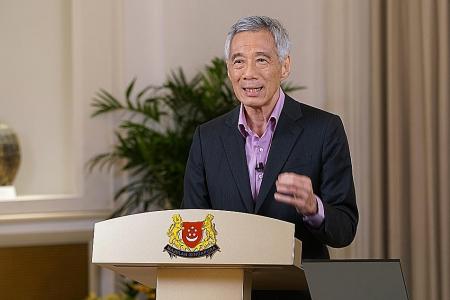Covid-19 testing to become a routine in Singapore: PM Lee
Describing testing strategy as one of the most aggressive in the world, experts say it is the right way to go
In a speech broadcast live yesterday, Prime Minister Lee Hsien Loong said he does not expect the Covid-19 virus to disappear and that it would become part of daily life, circulating "in pockets of the global population", just like the common flu and dengue fever.
Moving forward, Mr Lee said Singapore's strategy to deal with the virus will focus on three key areas - testing, contact tracing and vaccinations.
He said Singapore will test faster and more extensively, and it will become a routine in places like malls, schools and workplaces.
Alternative tests such as the antigen rapid test (ART), which return results in about 30 minutes, will be used.
"We will not only test to identify infections when a new case pops up. We will also routinely and regularly test people who appear well, in normal work or social or community settings, to make them and these places safe," said Mr Lee.
He added that self-administered or DIY test kits that are less uncomfortable and easier to use than the polymerase chain reaction (PCR) swab tests will soon be available over the counter at pharmacies.
Experts The New Paper spoke to believe the testing blueprint outlined by Mr Lee is one of the most aggressive in the world and the right way to go.
Dr Leong Hoe Nam, an infectious diseases specialist at Mount Elizabeth Novena Hospital, said: "Such aggressive testing should be the way forward. The more we test, the more cases we will find and the more we can control the spread."
Associate Professor Alex Cook, vice-dean of research at the National University of Singapore's Saw Swee Hock School of Public Health, said the World Health Organisation has consistently urged countries to "test, test, test".
"With a high proportion of secondary cases due to pre-symptomatic or asymptomatic spread, testing is critical to get cases isolated as soon as possible, and their contacts traced and quarantined.
"Mass testing can, in principle, help identify cryptic cases in the community whom we would not find otherwise.
"We know how vital it is to isolate cases to prevent spread, and widespread testing is one of the best ways to target isolation most accurately," said Prof Cook.
Speaking later at a press conference held by the multi-ministry task force tackling the pandemic, Health Minister Ong Ye Kung said an average of more than 55,000 PCR tests and ARTs were conducted daily in the second half of last month.
"That translates to more than 76,500 individuals tested per day. And we will continue to step up the number of tests. Moving forward, we will extensively roll out fast and easy tests, and that will complement our current PCR tests," Mr Ong added.
Mr Lee explained that rostered routine testing is currently carried out in higher risk settings such as migrant worker dormitories, construction worksites, shipyards, air and seaports, hospitals and nursing homes.
"With faster, cheaper tests, we can do routine testing at more workplaces like offices, restaurants and shopping malls," he said.
"This will enable us to detect Covid-19 cases more quickly so that we can isolate them and ring-fence their contacts promptly, before the virus spreads further."
Get The New Paper on your phone with the free TNP app. Download from the Apple App Store or Google Play Store now


